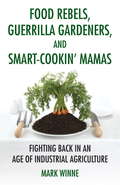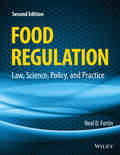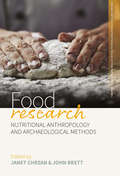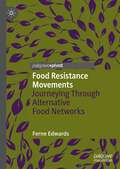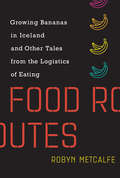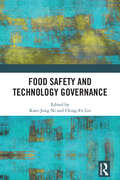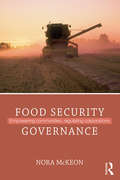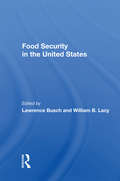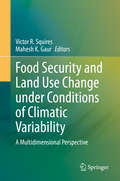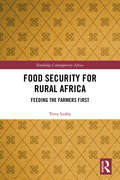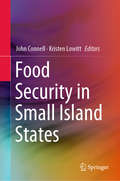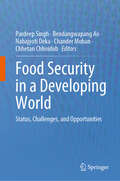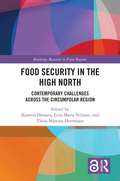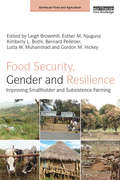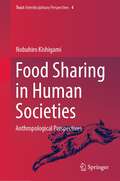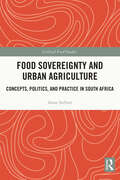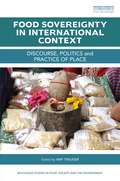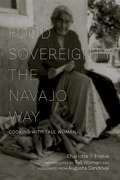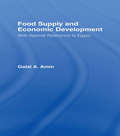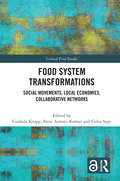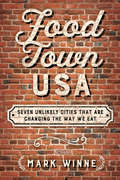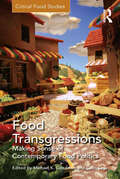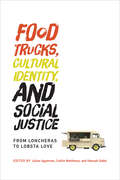- Table View
- List View
Food Rebels, Guerrilla Gardeners, and Smart-Cookin' Mamas
by Mark WinneIn an age of uncertainty about how climate change may affect the global food supply, industrial agribusiness promises to keep the world fed. Through the use of factory "farms," genetic engineering, and the widespread application of chemicals, they put their trust in technology and ask consumers to put our trust in them. However, a look behind the curtain reveals practices that put our soil, water, and health at risk. What are the alternatives? And can they too feed the world? The rapidly growing alternative food system is made up of people reclaiming their connections to their food and their health. A forty-year veteran of this movement, Mark Winne introduces us to innovative "local doers" leading the charge to bring nutritious, sustainable, and affordable food to all. Heeding Emerson's call to embrace that great American virtue of self-reliance, these leaders in communities all across the country are defying the authority of the food conglomerates and taking matters into their own hands. They are turning urban wastelands into farms, creating local dairy collectives, preserving farmland, and refusing to use genetically modified seed. They are not only bringing food education to children in elementary schools, but also offering cooking classes to adults in diabetes-prone neighborhoods--and taking the message to college campuses as well. Such efforts promote food democracy and empower communities to create local food-policy councils, build a neighborhood grocery store in the midst of a food desert, or demand healthier school lunches for their kids. Winne's hope is that all of these programs, scaled up and adopted more widely, will ultimately allow the alternative food system to dethrone the industrial. Food Rebels, Guerrilla Gardeners, and Smart-Cookin' Mamas challenges us to go beyond eating local to become part of a larger solution, demanding a system that sustains body and soul.
Food Regulation: Law, Science, Policy, and Practice
by Neal D. FortinFeaturing case studies and discussion questions, this textbook - with revisions addressing significant changes to US food law - offers accessible coverage appropriate to a wide audience of students and professionals. * Overviews the federal statutes, regulations, and regulatory agencies concerned with food regulation and introduces students to the case law and statutory scheme of food regulation* Focuses updated content on the 2011 FDA Food Safety Modernization Act (FSMA), the biggest change to US food law since the 1930s* Contains over 20% new material, particularly a rewritten import law chapter and revisions related to food safety regulation, health claims, and food defense* Features case studies and discussion questions about application of law, policy questions, and emerging issues
Food Research: Nutritional Anthropology and Archaeological Methods (Research Methods for Anthropological Studies of Food and Nutrition #1)
by John Brett Janet ChrzanBiocultural and archaeological research on food, past and present, often relies on very specific, precise, methods for data collection and analysis. These are presented here in a broad-based review. Individual chapters provide opportunities to think through the adoption of methods by reviewing the history of their use along with a discussion of research conducted using those methods. A case study from the author's own work is included in each chapter to illustrate why the methods were adopted in that particular case along with abundant additional resources to further develop and explore those methods.
Food Resistance Movements: Journeying Through Alternative Food Networks (Alternatives and Futures: Cultures, Practices, Activism and Utopias)
by Ferne EdwardsThis book examines food resistance movements as a form of alternative food network, charting the author’s journey as a cultural anthropologist through three food resistance movements.In Australia, freegans’ consumption of ‘garbage’ in the food waste movement of the early 2000s reveals the extent of food going to waste from commercial sources while people go hungry. In contrast, Venezuela’s food sovereignty movement is part of a national transition from a capitalist to socialist economy, highlighting processes of decentralisation, collectivisation, and government-grassroots’ coalitions. The study of autonomous spaces in Catalonia illuminates how food sharing can enable people to live their politics, as well as the centrality of issues around urban governance, consumption, technology and use of space to food resistance efforts. This engaging volume brings an important and engaging contribution to current discussions around the transition to just and sustainable food systems.
Food Routes: Growing Bananas in Iceland and Other Tales from the Logistics of Eating
by Robyn MetcalfeFinding opportunities for innovation on the path between farmer and table. Even if we think we know a lot about good and healthy food—even if we buy organic, believe in slow food, and read Eater—we probably don't know much about how food gets to the table. What happens between the farm and the kitchen? Why are all avocados from Mexico? Why does a restaurant in Maine order lamb from New Zealand? In Food Routes, Robyn Metcalfe explores an often-overlooked aspect of the global food system: how food moves from producer to consumer. She finds that the food supply chain is adapting to our increasingly complex demands for both personalization and convenience—but, she says, it won't be an easy ride. Networked, digital tools will improve the food system but will also challenge our relationship to food in anxiety-provoking ways. It might not be easy to transfer our affections from verdant fields of organic tomatoes to high-rise greenhouses tended by robots. And yet, argues Metcalfe—a cautious technology optimist—technological advances offer opportunities for innovations that can get better food to more people in an increasingly urbanized world. Metcalfe follows a slice of New York pizza and a club sandwich through the food supply chain; considers local foods, global foods, and food deserts; investigates the processing, packaging, and storage of food; explores the transportation networks that connect farm to plate; and explains how food can be tracked using sensors and the Internet of Things. Future food may be engineered, networked, and nearly independent of crops grown in fields. New technologies can make the food system more efficient—but at what cost to our traditionally close relationship with food?
Food Safety Policy, Science, and Risk Assessment: Workshop Proceedings
by Food ForumThe National Academies Press (NAP)--publisher for the National Academies--publishes more than 200 books a year offering the most authoritative views, definitive information, and groundbreaking recommendations on a wide range of topics in science, engineering, and health. Our books are unique in that they are authored by the nation's leading experts in every scientific field.
Food Safety and Technology Governance
by Kuei-Jung Ni Ching-Fu LinRecent advances in agri-food technology have brought about increasing complexity and emerging challenges to food safety regulation and governance, with many countries greatly divided in their regulatory approaches. As more advanced CRISPR based gene-editing technologies, and novel foods such as cloned animal products, non-traditional plants, nanofood, and plant-based meat are rapidly being developed, debates arise as to whether the existing models of governance require revision to ensure consumer safety. Of equal importance is the extensive use of pesticides, additives, and animal drugs which raise concerns over the methods and approaches of government approval and phasing out of potentially risk-causing chemicals. Heightened public criticism of food safety and technology poses a significant challenge to governments around the world, which struggle to strike a proper balance between technocracy- and democracy-oriented risk governance models. Drawing on expertise from the United States, European Union, Japan, China, Korea, Association of South East Asian Nations, Malaysia, and Taiwan, this book explores existing and emerging issues of food law and policy in the context of technology governance to offer an overarching framework for the interaction between food regulation and technology. It will be essential reading for academics, students and practitioners with an interest in food law and policy, agricultural law and policy and food safety and nutrition studies.
Food Security Governance: Empowering Communities, Regulating Corporations (Routledge Critical Security Studies)
by Nora McKeonThis book fills a gap in the literature by setting food security in the context of evolving global food governance. Today’s food system generates hunger alongside of food waste, burgeoning health problems, massive greenhouse gas emissions. Applying food system analysis to review how the international community has addressed food issues since World War II, this book proceeds to explain how actors link up in corporate global food chains and in the local food systems that feed most of the world’s population. It unpacks relevant paradigms – from productivism to food sovereignty – and highlights the significance of adopting a rights-based approach to solving food problems. The author describes how communities around the world are protecting their access to resources and building better ways of producing and accessing food, and discusses the reformed Committee on World Food Security, a uniquely inclusive global policy forum, and how it could be supportive of efforts from the base. The book concludes by identifying terrains on which work is needed to adapt the practice of the democratic public sphere and accountable governance to a global dimension and extend its authority to the world of markets and corporations. This book will be of interest to students of food security, global governance, development studies and critical security studies in general.
Food Security In The United States
by William B. Lacey Lawrence M. BuschDespite the fact that every year it produces a larger surplus of agricultural products than any other country in the world, the U.S. still must contend with a number of important but often unaddressed issues related to food security, including problems of soil erosion, water supply, energy availability, nutrition; farm worker health and safety, and product distribution. This book; containing contributions from authorities in both the natural and social sciences, expands the range of issues pertinent to the security of the U.S. food system, taking into account the adequacy and sustainability of the food supply, equity in access to food by the entire population, the nutritional quality of food, and the costs and benefits (social, economic, and health) of the food system as it is presently organized. Each of the authors considers an aspect of U.S. food security from the point of view of a specific discipline, as well as in terms of broader policy implications.
Food Security and Land Use Change under Conditions of Climatic Variability: A Multidimensional Perspective
by Victor R. Squires Mahesh K. GaurThis volume analyzes the global challenges of food security, land use changes, and climate change impacts on food production in order to recommend sustainable development policies, anticipate future food services and demands, and identify the economic benefits and trade-offs of meeting food security demands and achieving climate change mitigation objectives. The key points of analysis that form the conclusions of this book are based on measuring the quantity and quality of land and water resources, and the rate of use of sustainable management of these resources in the context of socio-economic factors, including food security, poverty, and climate change impacts. In six parts, readers will learn about these crucial dimensions of the affects of climate change on food security, and will gain a better understanding of how to assess the trade-offs when combating multiple climate change challenges and how to develop sustainable solutions to these problems. The book presents multidimensional perspectives from expert contributors, offering holistic and strategic approaches to link knowledge on climate change and food security with action in the form of policy recommendations, with a focus on sociological and socio-economic components of climate change impacts. The intended audience of the book includes students and researchers engaged in climate change and food security issues, NGOs, and policy makers.
Food Security for Rural Africa: Feeding the Farmers First (Routledge Contemporary Africa)
by Terry LeahyAt least fifty years of projects aimed at the rural poor in Africa have had very little impact. Up to half of the children of these countries are still suffering from stunting and malnutrition. Soil degradation and poor crop yields are ubiquitous. Projects are almost always aimed at helping local people to solve their problems by growing for the market. In some countries, projects link poor villagers into cooperatives to produce a commercial output. In other countries, projects target more competent entrepreneurial villagers. Almost all these projects fail after several years. Even those that are successful make few inroads into the problems. While the slogan 'feeding the farmers first' comes from the Philippines, it is particularly applicable to much of Africa, where household food security can come from household production. This book explains how projects can be designed that increase food security through subsistence production. Focusing on particular people and projects, it gives a sociological analysis of why this is so difficult to manage. This book challenges the models promoted by academics in the field of development studies and argues against the strategies adopted by most donor organizations and government bodies.It explains why commercial projects have been so ubiquitous even though they rarely work. It gives practical tips on how to set up villages and farms to achieve sustainable solutions that also provide plenty of nutritious food. The book is written to be accessible and engaging. For anyone planning to work in the rural areas of Africa, this book is required reading.
Food Security in Small Island States
by John Connell Kristen LowittThis book provides a contemporary overview of the social-ecological and economic vulnerabilities that produce food and nutrition insecurity in various small island contexts, including both high islands and atolls, from the Pacific to the Caribbean. It examines the historical and contemporary circumstances that have accompanied the shift from subsistence production to the consumption of imported, processed foods and drinks, and the impact of this transition on nutrition and the rise of non-communicable diseases. It also assesses the challenges involved in reversing this trend, and how more effective social and economic policies, agricultural and fisheries strategies, and governance arrangements could promote more resilient and sustainable small island food systems. It offers both theoretical and practical perspectives, and brings together a broad range of policy areas, e.g. agriculture, food, commerce, health, planning and socio-economic policy.Given its scope, the book offers a valuable resource for a range of disciplines in a number of regional contexts, and for the growing number of scholars and practitioners working on and in small island states. It will be of particular value as the first book to examine the diversity and commonalities of island states around the globe as they confront issues of food security.
Food Security in a Developing World: Status, Challenges, and Opportunities
by Pardeep Singh Bendangwapang Ao Nabajyoti Deka Chander Mohan Chhetan ChhoidubThe book tries to answer the most fundamental question of whether there is a link between abundant food supply and economic growth with respect to a higher degree of human development. In order to have flourishing economic growth within a country the need for a food security system is a must. The world as we know is faced with shortages of food supply which has been a major factor in the country's economic development. The book is an attempt to understand the problems and current situation of food systems in the developing world. It focuses on the pathways to understand the challenges that it faces and predict future scenarios. The motive is to create academic literature to understand the basis of sustainable food security. The social, economic, and political factors become the main theme of the book. It focuses on the interdisciplinary nature of food security. Many a time we only understand the idea of food security through the lens of scientific nature but in the meantime, it forgets the other important factors that are governing the issue of food security. The inclusion of the cases section in the book helps to outline the current scenarios of the developing world. It helps to formulate a pathway or a way forward to understand the causes of food security. Food has now become a political context in the international system. The need for analyzing the political angle is necessary. The context of innovations and technological developments forms an important part of food security. The critique of existing policy systems across the developing world is a must need discussion as it is the policies that will make the food systems sustainable. Last but not least is to look at how the global food systems work and how far it has been able to fix the problems of food insecurity in the developing world. Overall, the book is an excellent interdisciplinary food security literature.
Food Security in the High North: Contemporary Challenges Across the Circumpolar Region (Routledge Research in Polar Regions)
by Thora Martina Herrmann Kamrul Hossain Lena Maria NilssonThis book explores the challenges facing food security, sustainability, sovereignty, and supply chains in the Arctic, with a specific focus on Indigenous Peoples. Offering multidisciplinary insights with a particular focus on populations in the European High North region, the book highlights the importance of accessible and sustainable traditional foods for the dietary needs of local and Indigenous Peoples. It focuses on foods and natural products that are unique to this region and considers how they play a significant role towards food security and sovereignty. The book captures the tremendous complexity facing populations here as they strive to maintain sustainable food systems – both subsistent and commercial – and regain sovereignty over traditional food production policies. A range of issues are explored from food contamination risks, due to increasing human activities in the region, such as mining, to changing livelihoods and gender roles in the maintenance of traditional food security and sovereignty. The book also considers processing methods that combine indigenous and traditional knowledge to convert the traditional foods, which are harvested or hunted, into local foods. This book offers a broader understanding of food security and sovereignty, and will be of interest to academics, scholars, and policy makers working in food studies, geography and environmental studies, agricultural studies, sociology, anthropology, political science, health studies, and biology.
Food Security, Gender and Resilience: Improving Smallholder and Subsistence Farming (Earthscan Food and Agriculture)
by Leigh Brownhill Esther Njuguna Kimberly L. Bothi Bernard Pelletier Lutta Muhammad Gordon M. HickeyThrough the integration of gender analysis into resilience thinking, this book shares field-based research insights from a collaborative, integrated project aimed at improving food security in subsistence and smallholder agricultural systems. The scope of the book is both local and multi-scalar. The gendered resilience framework, illustrated here with detailed case studies from semi-arid Kenya, is shown to be suitable for use in analysis in other geographic regions and across disciplines. The book examines the importance of gender equity to the strengthening of socio-ecological resilience. Case studies reflect multidisciplinary perspectives and focus on a range of issues, from microfinance to informal seed systems. The book’s gender perspective also incorporates consideration of age or generational relations and cultural dimensions in order to embrace the complexity of existing socio-economic realities in rural farming communities. The issue of succession of farmland has become a general concern, both to farmers and to researchers focused on building resilient farming systems. Building resilience here is shown to involve strengthening households’ and communities’ overall livelihood capabilities in the face of ongoing climate change, global market volatility and political instability.
Food Sharing in Human Societies: Anthropological Perspectives (Trust #4)
by Nobuhiro KishigamiThis book explores why human beings share food with others using a humanistic anthropological approach. This book provides a comparative examination of distinct features and historical changes in food-sharing practices in various hunting-gathering societies, especially in the Inuit. The author considers human nature through various human food-sharing practices. Food sharing is a characteristic of human behavior and has been one of the central topics in anthropological studies of hunter-gatherers for a long time. While anthropologists have attempted to understand it in functional, historical, adaptational, social, cultural, psychological, or phenomenological perspective, they have failed to convincingly explain its origin, variation, existence or/and change. Recently, evolutionary ecology or behavioral ecology has dominated research of the topic. However, neither of them adequately considers social, cultural and historical factors in the analysis of human food-sharing practices. This book is an essential and fundamental study for every researcher interested in the relationship between human nature, society and culture.
Food Sovereignty and Urban Agriculture: Concepts, Politics, and Practice in South Africa (Critical Food Studies)
by Anne SiebertThis book analyses the interplay of urban agriculture and food sovereignty through the innovative lens of the "critical urban food perspective". It focuses on the mobilisation of urban food producers as a powerful response to highly exclusionary dynamics in the agri-food system including insufficient food access and disastrous land dispossessions. This volume particularly aims to fill the gap in the current literature by engaging with food sovereignty discourses and movements in urban areas. Related activism of urban food producers in the Global South remains underrepresented in practice and in literature. Therefore, this book engages with the lived realities of an urban agriculture initiative in George, South Africa. Building on theoretical notions of the "right to the city" and "everyday forms of resistance", the book illuminates how deprived food producers expose inequalities and propose alternatives. The findings of in-depth empirical research reveal that dwellers perceive farming as a mean to overcome historical segregation, high food prices, and unhealthy nutrition. Hence, they breathe life into food sovereignty in practice and suggest further alliances beyond the city. The book will be of interest to scholars and students of alternative food politics, agrarian transformation, and food movements as well as rural-urban intersections.
Food Sovereignty in International Context: Discourse, politics and practice of place (Routledge Studies in Food, Society and the Environment)
by Amy TraugerFood sovereignty is an emerging discourse of empowerment and autonomy in the food system with the development of associated practices in rural and some urban spaces. While literature on food sovereignty has proliferated since the first usage of the term in 1996 at the Rome Food Summit, most has been descriptive rather than explanatory in nature, and often confuses food sovereignty with other movements and objectives such as alternative food networks, food justice, or food self-sufficiency. This book is a collection of empirically rich and theoretically engaged papers across a broad geographical spectrum reflecting on what constitutes the politics and practices of food sovereignty. They contribute to a theoretical gap in the food sovereignty literature as well as a relative shortage of empirical work on food sovereignty in the global "North", much previous work having focussed on Latin America. Specific case studies are included from Canada, Norway, Switzerland, southern Europe, UK and USA, as well as Africa, India and Ecuador. The book presents new research on the emergence of food sovereignties. It offers a wide variety of empirical examples and a theoretically engaged framework for explaining the aims of actors and organizations working toward autonomy and democracy in the food system.
Food Sovereignty the Navajo Way: Cooking with Tall Woman
by Charlotte J. FrisbieAround the world, indigenous peoples are returning to traditional foods produced by traditional methods of subsistence. The goal of controlling their own food systems, known as food sovereignty, is to reestablish healthy lifeways to combat contemporary diseases such as diabetes and obesity. This is the first book to focus on the dietary practices of the Navajos, from the earliest known times into the present, and relate them to the Navajo Nation&’s participation in the global food sovereignty movement. It documents the time-honored foods and recipes of a Navajo woman over almost a century, from the days when Navajos gathered or hunted almost everything they ate to a time when their diet was dominated by highly processed foods.
Food Supply and Economic Development: with Special Reference to Egypt
by Galal A. AminFirst Published in 1966. Routledge is an imprint of Taylor & Francis, an informa company.
Food System Transformations: Social Movements, Local Economies, Collaborative Networks (Critical Food Studies)
by Cordula KroppThis book examines the role of local food movements, enterprises and networks in the transformation of the currently unsustainable global food system. It explores a series of innovations designed to re-integrate sustainable modes of food production and encourage food sovereignty. It provides detailed insights into a specialised network of social actors collaborating in novel ways and creating new economic arrangements across different geographical locales. In working to devise ‘local solutions to global problems’, the initiatives explored in the book represent a ‘second-generation’ food social movement which is less preoccupied with distinctive local qualities than with building socially just food systems aimed at delivering healthy nutrition worldwide. Drawing on fieldwork undertaken in sites across Europe, the USA and Brazil, the book provides a rich collection of case studies that offer a fresh perspective on the role of grassroots action in the transition to more sustainable food production systems. Addressing a substantive gap in the literature that falls between global analyses of the contemporary food system and highly localised case studies, the book will appeal to those teaching food studies and those conducting research on civic food initiatives or on environmental social movements more generally.
Food TV (Routledge Television Guidebooks)
by Tasha OrenThis book serves up an accessible, critical introduction to food television, providing readers with a solid foundation for understanding how culinary culture became pop culture via the medium of television. The book follows FoodTV’s journey from purely instructional resource to a wide variety of formats, from celebrity chef and restaurant profiles, to culinary travel and every manner of cooking competition from kids to cannabis. Tasha Oren traces the generic expansion of cooking on television as she argues for its development as a uniquely apt lens through which to observe and understand television’s own dramatic extension from network to cable to streaming platforms. She demonstrates how FoodTV became popular commercial television through its growth beyond instruction, response to industrial and cultural change, and a decisive turn away from an association with domesticity or femininity. The story of FoodTV offers a new understanding of how certain material, stylistic and textual practices that make up television emerge as conventions, and how such conventions both endure and evolve. This book is an ideal guide for students and scholars of media studies, television studies, food studies, and cultural studies.
Food Town, USA: Seven Unlikely Cities That are Changing the Way We Eat
by Mark WinneLook at any list of America's top foodie cities and you probably won't find Boise, Idaho or Sitka, Alaska. Yet they are the new face of the food movement. Healthy, sustainable fare is changing communities across this country, revitalizing towns that have been ravaged by disappearing industries and decades of inequity.What sparked this revolution? To find out, Mark Winne traveled to seven cities not usually considered revolutionary. He broke bread with brew masters and city council members, farmers and philanthropists, toured start-up incubators and homeless shelters. What he discovered was remarkable, even inspiring.In Bethlehem, Pennsylvania, once a company steel town, investment in the arts has created a robust new market for local restaurateurs. In Alexandria, Louisiana, "one-stop shopping” food banks help clients apply for health insurance along with SNAP benefits. In Jacksonville, Florida, aeroponics are bringing fresh produce to a food desert.Over the course of his travels, Winne experienced the power of individuals to transform food and the power of food to transform communities. The cities of Food Town, USA remind us that innovation is ripening all across the country, especially in the most unlikely places.
Food Transgressions: Making Sense of Contemporary Food Politics (Critical Food Studies)
by Colin Sage Michael K. GoodmanReconnecting so-called alternative food geographies back to the mainstream food system - especially in light of the discursive and material 'transgressions' currently happening between alternative and conventional food networks, this volume critically interrogates and evaluates what stands for 'food politics' in these spaces of transgression now and in the near future and addresses questions such as: What constitutes 'alternative' food politics specifically and food politics more generally when organic and other 'quality' foods have become mainstreamed? What has been the contribution so far of an 'alternative food movement' and its potential to leverage further progressive change and/or make further inroads into conventional systems? What are the empirical and theoretical bases for understanding the established and growing 'transgressions' between conventional and alternative food networks? Offering a better understanding of the evolving position of the corporate food system vis a vis alternative food networks, this book considers the prospects for economic, social, cultural and material transformations led by an increasingly powerful and legitimated alternative food network.
Food Trucks, Cultural Identity, and Social Justice: From Loncheras to Lobsta Love (Food, Health, and the Environment)
by Julian Agyeman Caitlin Matthews Hannah SobelAspects of the urban food truck phenomenon, including community economic development, regulatory issues, and clashes between ethnic authenticity and local sustainability.The food truck on the corner could be a brightly painted old-style lonchera offering tacos or an upscale mobile vendor serving lobster rolls. Customers range from gastro-tourists to construction workers, all eager for food that is delicious, authentic, and relatively inexpensive. Although some cities that host food trucks encourage their proliferation, others throw up regulatory roadblocks. This book examines the food truck phenomenon in North American cities from Los Angeles to Montreal, taking a novel perspective: social justice. It considers the motivating factors behind a city's promotion or restriction of mobile food vending, and how these motivations might connect to or impede broad goals of social justice. The contributors investigate the discriminatory implementation of rules, with gentrified hipsters often receiving preferential treatment over traditional immigrants; food trucks as part of community economic development; and food trucks' role in cultural identity formation. They describe, among other things, mobile food vending in Portland, Oregon, where relaxed permitting encourages street food; the criminalization of food trucks by Los Angeles and New York City health codes; food as cultural currency in Montreal; social and spatial bifurcation of food trucks in Chicago and Durham, North Carolina; and food trucks as a part of Vancouver, Canada's, self-branding as the “Greenest City.”ContributorsJulian Agyeman, Sean Basinski, Jennifer Clark, Ana Croegaert, Kathleen Dunn, Renia Ehrenfeucht, Emma French, Matthew Gebhardt, Phoebe Godfrey, Amy Hanser, Robert Lemon, Nina Martin, Caitlin Matthews, Nathan McClintock, Alfonso Morales, Alan Nash, Katherine Alexandra Newman, Lenore Lauri Newman, Alex Novie, Matthew Shapiro, Hannah Sobel, Mark Vallianatos, Ginette Wessel, Edward Whittall, Mackenzie Wood
